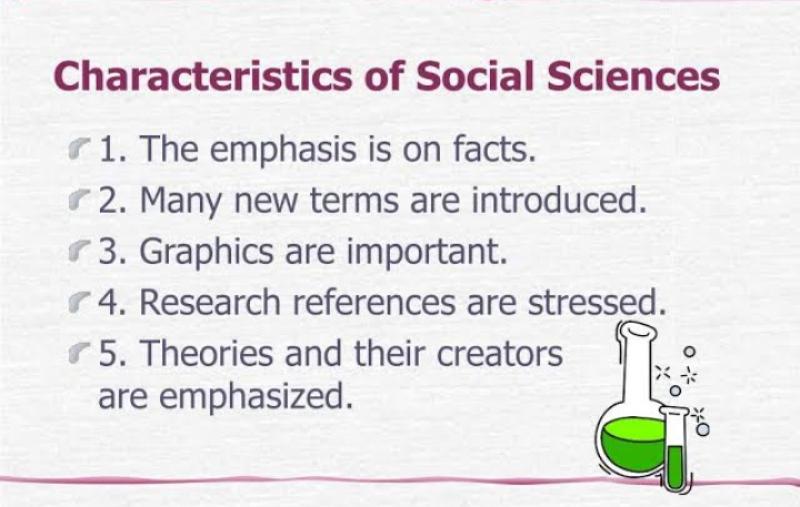What are the characteristics of social science?
Social science is a broad field that encompasses the study of human society and social relationships. It includes disciplines such as sociology, psychology, anthropology, economics, political science, and geography. Here are some key characteristics of social science:
Empirical Approach:
- Social science relies on empirical evidence and systematic observation. Researchers gather data through surveys, interviews, experiments, and observations to draw conclusions about human behavior and social phenomena.
Interdisciplinary Nature:
- Social science is often interdisciplinary, drawing on insights and methodologies from various fields to understand complex social issues. For example, sociology may intersect with psychology, economics, and political science in the study of social structures and behavior.
Focus on Society and Culture:
- Social science investigates the structures, institutions, and dynamics of human societies. It examines how cultures develop, how societies function, and how individuals interact within these contexts.
Human Behavior and Interaction:
- Understanding human behavior and social interactions is a central focus of social science. This includes studying how individuals make decisions, form relationships, and participate in social groups.
Use of Theories and Models:
- Social scientists develop and use theories and models to explain and predict social phenomena. These frameworks help organize observations and guide research efforts.
Qualitative and Quantitative Research:
- Social science employs both qualitative and quantitative research methods. Qualitative methods involve exploring the richness and depth of social phenomena, while quantitative methods involve numerical data analysis and statistical techniques.
Causal Relationships:
- Social science seeks to identify causal relationships between variables. Researchers aim to understand why certain social phenomena occur and what factors influence them.
Application to Real-world Issues:
- Social science research often addresses real-world problems and contributes to the development of policies and solutions. For example, economists may study the impact of policies on economic development, while sociologists may examine the effects of social programs.
Ethical Considerations:
- Ethical considerations are important in social science research. Researchers must ensure the well-being and confidentiality of participants, and they must conduct studies with integrity and transparency.
Dynamic and Evolving Field:
- Social science is dynamic and responsive to changes in society. It adapts to new technologies, emerging issues, and evolving social dynamics.
Critical Analysis:
- Social scientists critically analyze existing theories and research findings. They seek to challenge assumptions, question established norms, and contribute to the ongoing development of knowledge in their respective fields.
Contextual Understanding:
- Social science emphasizes the importance of understanding social phenomena within their cultural, historical, and institutional contexts. This contextual understanding is crucial for interpreting social dynamics accurately.
Understanding these characteristics provides insights into how social scientists approach the study of human behavior, society, and culture. The interdisciplinary and empirical nature of social science contributes to its role in addressing complex social issues and informing public policy.
What are the characteristics that define social science as a field of study?
Social science is a broad field of study that examines human society and the relationships between people. It is distinguished from other disciplines by its focus on social phenomena, such as culture, economics, politics, and psychology.
Some of the key characteristics of social science include:
- Empiricism: Social scientists use scientific methods to collect and analyze data. This means that they make observations, test hypotheses, and draw conclusions based on evidence.
- Objectivity: Social scientists strive to be objective in their research. This means that they try to avoid bias and to present their findings in a fair and impartial manner.
- Generalizability: Social scientists aim to develop findings that can be generalized to a larger population. This means that they try to conduct research in a way that is representative of the population they are studying.
- Theory building: Social scientists develop theories to explain social phenomena. Theories are general statements about how the world works, and they can be used to predict future events and to develop interventions to solve social problems.
How is social science distinguished from other disciplines, and what topics fall under its purview?
Social science is distinguished from other disciplines by its focus on social phenomena. Other disciplines, such as the natural sciences and the humanities, have different foci.
The natural sciences focus on the physical world and the natural laws that govern it. The humanities focus on human culture and the arts.
Some of the topics that fall under the purview of social science include:
- Culture: Social scientists study culture, which is the shared beliefs, values, customs, and traditions of a group of people.
- Economics: Social scientists study economics, which is the production, distribution, and consumption of goods and services.
- Politics: Social scientists study politics, which is the distribution of power and the making of decisions in society.
- Psychology: Social scientists study psychology, which is the scientific study of the mind and behavior.
In addition to these core disciplines, there are many other subfields of social science, such as anthropology, criminology, education, geography, sociology, and urban studies.
Are there interdisciplinary aspects or connections within the field of social science?
Yes, there are many interdisciplinary aspects or connections within the field of social science. For example, economists and sociologists often work together to study the social and economic factors that contribute to poverty and inequality. Political scientists and psychologists often work together to study the political attitudes and behaviors of citizens.
Interdisciplinary research is important in social science because it allows researchers to gain a more complete understanding of complex social phenomena. By drawing on the insights and perspectives of multiple disciplines, social scientists can develop more comprehensive and effective solutions to social problems.
Here are some examples of interdisciplinary research in social science:
- A team of economists, sociologists, and psychologists might study the impact of unemployment on mental health.
- A team of political scientists, geographers, and urban planners might study the effects of climate change on urban communities.
- A team of anthropologists, educators, and public health experts might study the factors that contribute to educational success among minority students.
Interdisciplinary research is an essential part of social science, and it is helping to advance our understanding of human society and to develop solutions to social problems.










